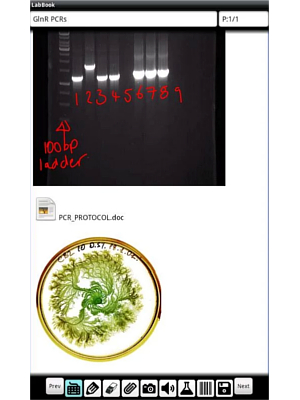Improving laboratory mobile app software for wider uptake
 The impact
The impact
Some of the best, most useful software has been created in researchers' free time, fitted in between real work. But what do you do once that software becomes popular? Other people fall in love with it and suddenly there is demand for further development that you just don't have the time for.
Mark Woodbridge, Geraint Barton and Derek Huntley of Imperial College London's Bioinformatics Support Service developed an Android app called LabBook to solve issues they could see were being encountered by researchers in their labs. Most scientific research is still documented in paper notebooks, and that leads to a huge amount of data being lost, says Woodbridge.
By contacting the Software Sustainability Institute and following their advice, Mark hopes to be in a better position to gain funding for further development of LabBook, with a strong foundation in place and an involved user base and developer community.
"We're in a much better position now, with Quick Start guides for users and an action plan for ourselves" Mark says. "We'll work through the list of recommendations and we hope to soon release a new version. It's still very much a work in progress, and we hope to run workshops and perhaps a hackathon around the use of mobile devices in labs – just to keep the ideas flowing, really."
The problem
He continues: "in terms of keeping and sharing data in the long term, it's very hard with paper records. So the idea was to create a more efficient way of capturing information and sharing it. You could create high fidelity records with images, audio and digital assets like data sets, all stored together. On paper, a researcher might write down where they've stored things, or maybe paste in a photograph – but they're basically discarding a lot of information that could be useful."
Beforehand, a few researchers were using software like Evernote and OneNote, but these still weren't creating the full archiving service that Woodbridge, Barton and Huntley felt was needed. So they created their own prototype app, linked to an online backup service.
"Our work was inspired by a funded project but was mostly carried out in our own time because we saw it as an opportunity to help our colleagues who work in labs" Mark explains. "The time we put into it was very fragmented, and we were new to the technology, so it was a bit of a mess, to be honest! We didn't have any strategy for future development and really, we needed some help."
The solution
With that in mind, Woodbridge contacted the Software Sustainability Institute for advice.
"That was just great. Mike [Jackson] has so much experience that he didn't need too much direction from us – he just got on with it, and gave us the advice we needed on development practices, on revision control, and on working with our users so that we could open up the code and take the pressure off of us to develop it."
LabBook already had a code repository in place, and the Institute was able to advise on migrating this to a public repository, open to outside developers. A set of processes was then suggested for running an effective open source project. The software was analysed, and changes were suggested to make it more accessible to new developers and able to evolve smoothly over time.
The advice from the Institute has been key, Woodbridge says.
"It was really useful – pragmatic and actionable. The SSI team have a lot of experience and can offer perspective on what works and what doesn't. Now we just have to work through and put the advice into action."
